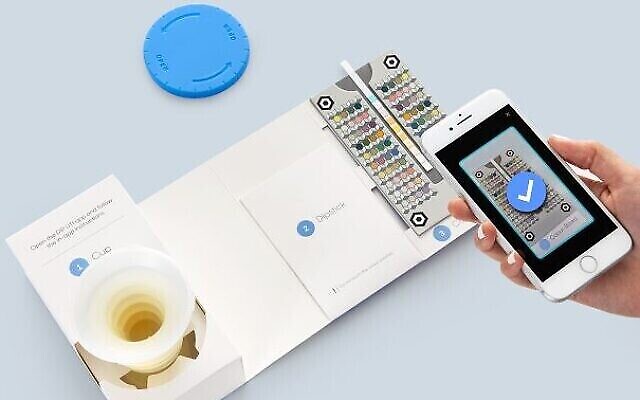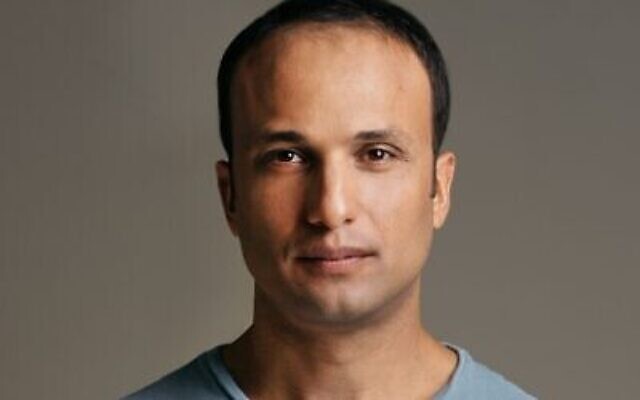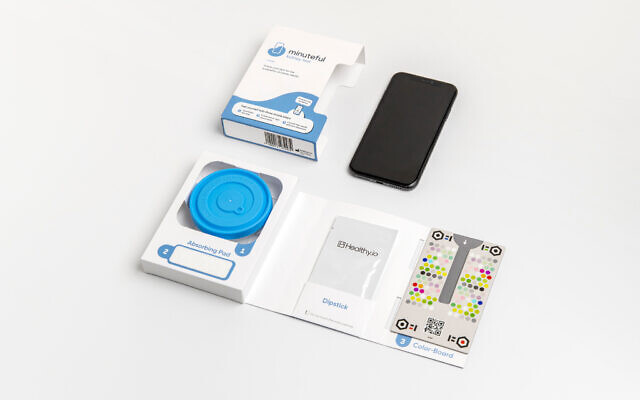‘Medical selfie’ firm says nup to the cup
Tel Aviv-based developer of at-home urine tests signs deal with outfit run by member of Dubai ruling family
ISRAELI startup Healthy.io, a maker of an FDA-approved smartphone app that allows users to take urine analysis tests at home, is hoping to bring its innovative health tech solution to the United Arab Emirates starting with a new agreement announced this week with a private local company founded by a member of Dubai’s ruling family.
The deal with Seed Group, a company of the private office of Sheikh Saeed bin Ahmed Al Maktoum, gives Healthy.io a partner on the ground in the UAE with local expertise, regulatory know-how, and access to top decision-makers in government and within the health community, said Joel Schoppig, VP Strategy at Healthy.io.
Seed Group is “really focused on deploying technology with a public benefit in the UAE and that’s where this partnership comes in,” Schoppig told The Times of Israel in an interview Wednesday.
We’re bringing our technology and know-how from other markets and they bring the deployment know-how, and we believe that we can scale [our solution] in the UAE,” he explained.
Founded in 2013, Healthy.io uses image recognition and artificial intelligence technologies to transform a smartphone camera into a scanner in order to analyse urine test strips with clinical-grade precision. The company provides testing kits through healthcare partners in Israel, the US, and the UK for patients, who then upload results to an app for their physicians to review. Healthy.io also launched a digital solution in 2020 for the management of chronic wounds, starting in the US.
The firm was the first in the world to win US Food and Drug Administration approval for a smartphone camera used as a medical device that compares with a lab scanner.
Urine is the second most frequently conducted diagnostic test in the world. People around the world who need to get their urine tested — including pregnant women, diabetics, those at risk of kidney disease, and people with high blood pressure — generally need to go to a lab, pee in a cup, and hand in the sample to a nurse. The nurse dips a stick into the urine and scans it in a designated device that performs the analysis. The results are provided hours later to the doctor or the patient.

Schoppig said Healthy.io sought to address these inefficiencies in central health systems as they limit access and can interfere with preventative care. Early detection of chronic kidney disease, through regular urinalysis testing for protein, can help patients and their physicians better manage their care and alleviate costly pressures on health systems, he said.
“All health systems are trying to get people at risk to test, so people with diabetes, high blood pressure, and so on, for protein in the urine. But the reality, because of the current process of getting a urine test done, a lot of people don’t get tested.
“In the UK, 50% of people with diabetes and 70% of people with high blood pressure don’t get the test done. In the US, it’s even worse, it’s like 80%,” Schoppig said, citing research provided by Healthy.io’s partners in the US and the UK including health care systems such as the NHS and others.
To develop its core solution, he said, the company asked itself, “How do we take images and visual processes that are done in the clinical realm and enable them to be done via smartphone?”
With Healthy.io kits, patients can perform the test “at the speed of their own life, so it can be Saturday morning or Tuesday afternoon, whenever is convenient,” Schoppig explained, adding that the company gleans important medical insights with this approach.
“We’re not solving a urine test [issue], we’re solving a problem of under-detection of protein in urine and of kidney disease,” he said.
Healthy.io had to make sure its kits are extremely user-friendly. The company does not really cater to “people who have the iPhone 13 and are super tech-savvy, that’s not where the problems of health care lie. We’re focusing on the people in their 70s and 80s that are chronic patients and who may live in rural areas and don’t get this critical test done.”
“If you can text, you can test,” Schoppig said, using a company tagline.

Healthy.io’s offerings are available through Israeli HMOs and the NHS in the UK “where we really scaled the solution,” he said. In 2021, the NHS provided a list of 600,000 diabetes patients who needed to be tested, “and said ‘go ahead and test them,’ and we engaged over 300,000 of those patients throughout the year and we have almost 200,000 patients tested, and really proven how you can do digital health intervention with real clinical value at scale.”
These are positive outcomes for patients and health systems since “the savings are really big if you can do a quick urine test now rather than spending on dialysis cost and hospital costs down the line.”
In the US, Healthy.io is working on building its team and “launching at scale” with local health plans this year, said Schoppig.
The UAE, he said, has “one of those health systems that is really open to doing real innovation and big public things if they find the right solutions. It’s a market that is very forward-looking, and innovation-driven, and very conscious of deploying solutions that work for their population.”
The country has one of the world’s highest prevalence rates of diabetes at about 19%. Healthy.io has estimated that around 800,000 people in the UAE should do the urine test and the company is now looking to hit the ground running once it gets the go-ahead to begin a testing campaign that could serve as a wider international model, Schoppig said.
Hisham Al Gurg, CEO of Seed Group, said in a statement Tuesday that the healthcare sector “needs to find the best possible techniques with the help of technology to not only offer timely treatments but also work towards the long-term goal of creating a healthy and happy world. Companies like Healthy.io are the very ones making this possible.”

Yonatan Adiri, founder and CEO of Healthy.io, said the company was “excited to collaborate with the Seed Group on bringing our technology to the nearly one million people in the Emirates at risk of kidney and cardiovascular diseases who are currently untested, and to close healthcare gaps” in the region. Adiri served as a former chief technology officer for the late former Israeli president Shimon Peres.
Times of Israel


comments